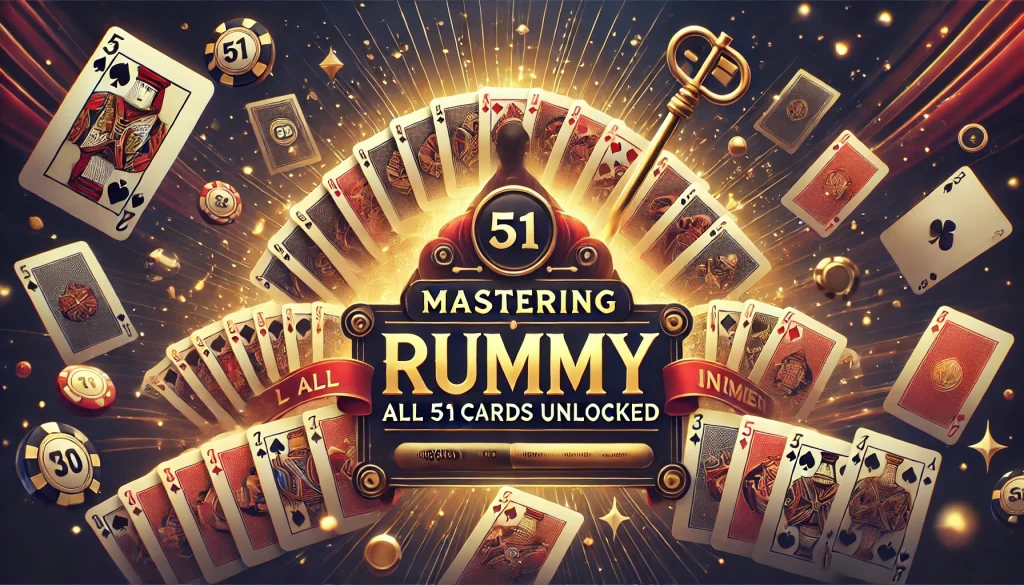Description

Rummy: The Complete Guide: Techniques, Variations, & Skills Rummy is a traditional card game that has enthralled players for many years. It is favored by both serious competitors and casual players due to its unique combination of skill, strategy, and a little bit of luck. Anyone hoping to succeed in this captivating hobby must comprehend the foundations of rummy. Forming sets & runs from a hand of cards is the fundamental element of the game of rummy. Three or four cards of the same rank but different suits make up a set, whereas three or more cards in the same suit make up a run.
When a player goes out, the goal is to meld these cards to reduce the number of points remaining in your hand. Depending on how many players there are, the game usually uses one or more standard decks of cards and has between two and six players. A certain number of cards are dealt to each player, and the remaining cards are arranged in a draw pile.
The discard pile is started with one card face-up. Players alternately draw from the discard pile or the draw pile, then discard one card. Choosing which cards to keep and which to discard while monitoring their opponents’ moves is where the strategic component enters the picture. Gaining an understanding of these fundamental rules is the first step towards becoming an expert player & creating winning strategies.
There are many variations of rummy to suit varying tastes and skill levels, so it’s not a single game. Among the most well-liked variations are Gin Rummy, Indian Rummy, and Kalooki, each with a distinct set of guidelines and strategies. For example, Gin Rummy, which is usually played with two players, places a strong emphasis on making melds as fast as possible while avoiding deadwood, or unmatched cards that can cost points at the end of the game. One player knocks to indicate that they think they have enough melds to win, ending the game.
Indian Rummy, on the other hand, is frequently played with two decks of cards and calls for players to form a minimum of two sequences, one of which needs to be a pure sequence (a run devoid of mistakes). Players must navigate through more cards and possible melds in this variation, which adds complexity and strategy. By permitting players to use wild cards and requiring them to form particular combinations in order to win, Kalooki adds yet another layer. Knowing these variations improves your gaming experience & enables you to modify your tactics in accordance with the particular rules of the game.
An essential Rummy skill that can greatly increase your winnings is card counting. Even though it might not be as simple as in games like blackjack, where certain cards have predetermined values, card counting in rummy entails monitoring which cards have been played and which are still in the deck. You can use this information to help you decide which cards to keep and which to throw away. For example, you may decide to hold onto lower-value cards that are less likely to be picked up by your opponents if you see that a number of high-value cards have already been played.
Also, knowing which cards your opponents are discarding or picking up can give you important information about their tactics. An opponent may be getting close to forming a meld with cards if they routinely remove cards from the discard pile. You can modify your own play by monitoring these trends, possibly by eliminating cards that would aid them in finishing their runs or sets. Although it takes time & focus to become proficient at card counting, it can significantly alter the outcome of competitive situations.
The core of rummy strategy is creating melds and sets, and mastering useful strategies can significantly improve your play. A basic strategy is to give early in the game priority to creating pure sequences. A pure sequence lowers the number of deadwood points you carry in the event that another player ends the round, in addition to helping you fulfill the prerequisites for leaving.
In order to do this, concentrate on gathering cards in the same suit one after the other, keeping in mind that wild cards may be used to fill in any missing cards. Keeping a careful eye on your opponents’ discards is another smart move. An opponent’s intention to form particular melds may be indicated if you observe that they are routinely discarding particular suits or ranks. You can undermine their plans and further your own by purposefully keeping those cards that were thrown away or by not throwing away cards that might help them. Also, think about varying the cards in your hand by holding a combination of high- and low-value cards.
This will give you the flexibility to modify your strategy as the game goes on. In rummy, the choice of whether to discard or pick up cards is crucial. When discarding, it’s important to think about how your discard might impact your opponents’ strategies in addition to your current hand. For example, it is advisable to keep a card that might be used to finish an opponent’s meld until you are certain it is no longer useful to you. It might be wise to discard a card early on if you have several melding options but it is unlikely to improve your hand.
Consider carefully how each card will fit into your larger plan when selecting cards from the draw or discard piles. Instead of throwing away a card you draw that doesn’t help you form a meld right away, think about keeping it if it could help you later in the game. Also, keep an eye on what your opponents are gathering; if they appear to be assembling for a particular meld, refrain from picking up cards that might help them finish their sets. As rummy players gain more expertise, they frequently look for cutting-edge strategies to improve their gameplay.
One such tactic is bluffing; although Rummy is largely a skill & strategy game, there are times when deceiving your opponents can give you an impact. For instance, your opponents might misunderstand your intentions and make bad choices if you discard a card that doesn’t seem important but could later help you complete a meld. Strategically controlling the composition of your hand during the game is another sophisticated tactic. This calls for adapting your melds and changing your approach according to how the game is going. Think about concentrating on making runs rather than sets if you find yourself holding onto too many high-value cards without making any melds, or the other way around.
As you move through the different rounds, this flexibility can help you stay ahead of your opponents and give you an advantage. In many variations of Rummy, jokers and wild cards are important components that give the game an exciting new level of complexity. Because they can be used to form melds or sets in place of any other card, these unique cards are extremely valuable assets in your possession. However, there are strategic considerations associated with their power; if another player goes out before you can effectively meld them, holding onto too many wild cards can result in high deadwood points. It’s important to balance the use of wild cards and jokers with more conventional melds.
Even though they can assist in finishing challenging combinations, depending too much on them could make it more difficult to create sets or pure sequences without wilds. Observe how other players are using their wild cards as well; if an opponent has picked up several wilds or jokers, they might be about to go out. You can decide when to play aggressively or defensively by keeping an eye on these dynamics. Eventually, commitment and practice are necessary to become proficient at rummy. Regular play, like any skill-based game, gradually strengthens strategies and enhances decision-making skills.
Interacting with different players can introduce you to a range of strategies & styles, which will improve your comprehension of the subtleties of the game. Every session provides insightful lessons that advance your development as a player, whether you’re playing competitively or just with friends. When luck doesn’t seem to be on your side or when opponents seem to be outwitting you all the time, it’s easy to lose patience, which is equally important when learning Rummy. But instead of responding hastily, keeping your composure enables you to consider every move carefully. You can improve your skills and develop a greater appreciation for this classic card game by combining patience and practice.
Rummy is a complex game that provides countless chances for skill development & strategic thinking, to sum up. Players can greatly increase their chances of winning by learning the fundamentals, investigating its variations, grasping card counting strategies, and using efficient melding and discarding tactics. Developing skills via practice guarantees ongoing player development, while more complex strategies like bluffing & handling wild cards enhance gameplay experiences even more. Regardless of your level of skill, adopting these components will surely improve your enjoyment of this timeless card game.


